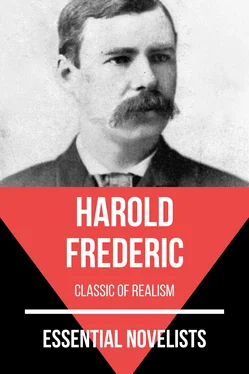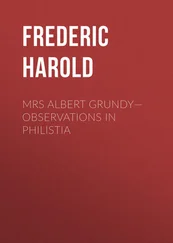It was then that Mr. Stewart, who had known my father, came to our relief. He first lent my mother a small sum of money—she would take no more, and was afterward very proud to repay him penny for penny. He further interested Sir William Johnson, Mr. Douw Fonda, Mr. John Butler, and others in the project of aiding her to establish a small school at Fort Hunter, where little children might be taught pure Dutch.
This language, which I have lived to see almost entirely fade from use, was even then thought to be most probably the tongue of the future in the colony, and there was the more need to teach it correctly, since, by the barbarous commingling of Rhenish peasant dialects, Irish and Scotch perversions of English, Indian phrases, the lingo of the slaves, and the curious expressions of the Yankees from the East, the most villanous jargon ever heard was commonly spoken in our Valley. My mother knew the noble language of her fathers in all its strength and sweetness, and her teaching was so highly prized that soon the school became a source of steady support to us all. Old "Uncle" Conrad—or Coonrod as we used to call him—the high-shouldered old pedagogue who was at once teacher, tithing-man, herb-doctor, and fiddler for our section, grumbled a little at the start; but either he had not the heart to take the bread from our mouths, or his own lips were soon silenced by the persuasion of our patrons.
It was out of respect for one of these, good old Douw Fonda, who came from Schenectady to live at Caughnawaga when I was two years old, that I had been named. But even more we all owed to the quiet, lonely man who had built the log house opposite Aries Creek, and who used so often to come over on Sunday afternoons in the warm weather and pay us a friendly visit.
My earliest recollections are of this Mr. Stewart, out of whom my boyish fancy created a beneficent sort of St. Nicholas, who could be good all the year round instead of only at New Year's. As I grew older his visits seemed more and more to be connected with me, for he paid little attention to my sisters, and rarely missed taking me on his knee, or, later on, leading me out for a walk. Finally I was asked to go over and stay with him for a week, and this practically was the last of my life with my mother. Soon afterward my aunt was engaged as his housekeeper, and I tacitly became a part of the household as well. Last of all, on my eighth birthday, in this same November of '57, I was formally installed as son of the house.
It was a memorable day, as I have said, in that Tulp was given me for my own. But I think that at the time I was even more affected by the fact that I was presented with a coat, and allowed to forever lay aside my odious aprons. These garments, made by my mother's own hands, had long been the bane of my existence. To all my entreaties to be dressed as the other boys of my age were, like Matthew Wormuth or Walter Butler instead of like a Dutch infant, she was accustomed to retort that young Peter Hansenius, the son of the dominie at Schenectady, had worn aprons until he was twelve. I had never seen Peter Hansenius, nor has it ever since been my fortune so to do, but I hated him bitterly as the cause of my humiliation.
Yet when I had got my coat, and wore it, along with breeches of the same pearl-gray color, dark woollen stockings, copper buckles on my shoes, and plain lace at my wrists and neck and on my new hat, I somehow did not feel any more like the other boys than before.
It was my bringing up, I fancy, which made me a solitary lad. Continual contact with Mr. Stewart had made me older than my years. I knew the history of Holland almost as well, I imagine, as any grown man in the neighborhood, and I had read many valuable books on the history of other countries and the lives of famous men, which were in Mr. Stewart's possession. Sir William also loaned me numerous books, including the Gentleman's Magazine, which I studied with delight. I had also from him Roderick Random, which I did not at all enjoy, nor do I even now understand how it, or for that matter any of its rowdy fellows, found favor with sensible people.
My reading was all very serious—strangely so, no doubt, for a little boy—but in truth reading of any sort would have served to make me an odd sheep among my comrades. I wonder still at the unlettered condition of the boys about me. John Johnson, though seven years my senior, was so ignorant as scarcely to be able to tell the difference between the Dutch and the Germans, and whence they respectively came. He told me once, some years after this, when I was bringing an armful of volumes from his father's mansion, that a boy was a fool to pore over books when he could ride and fish and hunt instead. Young Butler was of a better sort mentally, but he too never cared to read much. Both he and the Groats, the Nellises, the Cosselmans, young Wormuth—in fact, all the boys of good families I knew in the Valley—derided education, and preferred instead to go into the woods with a negro, and hunt squirrels while he chopped, or to play with their traps.
Perhaps they were not to be blamed much, for the attractions of the rough out-of-door life which they saw men leading all about them might very easily outweigh the quiet pleasures of a book. But it was a misfortune none the less in after-years to some of them, when they allowed uninformed prejudices to lead them into a terrible course of crime against their country and their neighbors, and paid their estates or their lives as the penalty for their ignorance and folly.
Fortunately, things are better ordered for the youth of the land in these days.
How a Stately Name Was Shortened and Sweetened.
––––––––
It was on the morrow after my birthday that we became finally convinced of the French retreat. Mr. Stewart had returned from his journeys, contented, and sat now, after his hot supper, smoking by the fire. I lay at his feet on a bear-skin, I remember, reading by the light of the flames, when my aunt brought the baby-girl in.
During the week that she had been with us, I had been too much terrified by the menace of invasion to take much interest in her, and Mr. Stewart had scarcely seen her. He smiled now, and held out his hands to her. She went to him very freely, and looked him over with a wise, wondering expression when he took her on his knee. It could be seen that she was very pretty. Her little white rows of teeth were as regular and pearly as the upper kernels on an ear of fresh sweet corn. She had a ribbon in her long, glossy hair, and her face shone pleasantly with soap. My aunt had made her some shoes out of deer-hide, which Mr. Stewart chuckled over.
"What a people the Dutch are!" he said, with a smile. "The child is polished like the barrel of a gun. What's your name, little one?"
The girl made no answer, from timidity I suppose.
"Has she no name? I should think she would have one," said I. It was the first time I had ever spoken to Mr. Stewart without having been addressed. But my new position in the house seemed to entitle me to this much liberty, for once.
"No," he replied, "your aunt is not able to discover that she has a name—except that she calls herself Pulkey, or something like that."
"That is not a good name to the ear," I said, in comment.
"No; doubtless it is a nickname. I have thought," he added, musingly, "of calling her Desideria."
I sat bolt upright at this. It did not become me to protest, but I could not keep the dismay from my face, evidently, for Mr. Stewart laughed aloud.
"What is it, Douw? Is it not to your liking?"
"Y-e-s, sir—but she is such a very little girl!"
"And the name is so great, eh? She'll grow to it, lad, she'll grow to it. And what kind of a Dutchman are you, sir, who are unwilling to do honor to the greatest of all Dutchmen? The Dr. Erasmus upon whose letters you are to try your Latin this winter—his name was Desiderius. Can you tell what it means? It signifies 'desired,' as of a mother's heart, and he took a form of the Greek verb erao, meaning about the same thing, instead. It's a goodly famous name, you see. We mean to make our little girl the truest lady, and love her the best, of all the women in the Valley. And so we'll give her a name—a fair-sounding, gracious, classical name—which no other woman bears, and one that shall always suggest home love—eh, boy?"
Читать дальше












